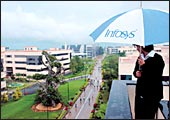 |
| Tech kingdom: Firms such as Infosys
give Bangalore its global recognition |
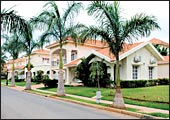 |
| Living the American dream: Minus picket
fences, in Garden City |
BANGALORE 2
If
no one told you so, you'd have trouble believing that Regent Park
is in Bangalore, not San Jose. Two-storey town houses built with
sloping roof and manicured lawns dot either side of wide, tree-lined
streets. Kids are playing catch against a setting sun and neighbours,
some of them just back from work, have stopped for a quick chat.
Inside this high-security, gated complex, you hear none of the
city's noisy traffic or inhale any of its noxious fumes. This
is a piece of Americana recreated in the heart of Bangalore's
tech nerve centre, Whitefield. "These communities offer security
and a getaway from the madness that is Bangalore," quips
Arjun Kalyanpur, a resident and radiologist, who returned from
the us four years ago and set up a one-man teleradiology practice
that today employs 90 people and has plans of moving into a nearby
tech park.
Kalyanpur and Regent Park symbolise the information
technology boom that over the last 10 years has transformed Bangalore
from a sleepy, retiree-city into the epicentre of global offshoring.
There are more than 2,000 companies registered with the Software
Technology Park of India (STPI), and dozens more open shop every
month. Over the last five months alone, 147 companies have opened
in the city, including Target, Fidelity, RSA Securities and Financial
Objects. The city pulls in Rs 37,600 crore in export earnings
every year from it alone-that's 37 per cent of the industry exports.
An estimated 2.1 lakh people work in the industry, making it the
first port of call for any foreign company wanting to set up an
India back office.
| BANGALORE FACT FILE |
FOUNDED: 1537 A.D.
AREA: 484 sq. km
POPULATION: 7.4 million
ROAD LENGTH: 3,000 km
PUBLIC TRANSPORT: 4,124 BMTC buses
PEAK POLLUTION LEVELS: SO2: 8 microgram/metre cube;
SPM (suspended particulate matter): 362 microgram/metre cube
INDUSTRIAL LOAD-SHEDDING: Nil*
RESIDENTIAL LOAD-SHEDDING: Nil*
POWER TARIFF: Rs 5.15 per unit (industrial); Rs 3.30
per unit (residential)
PIPED WATER SUPPLY: Four hours per day
COMMUTING TIME: 1 hour from Jayanagar to M.G. Road
(10 km) during peak hours
COST OF DOMESTIC HELP: Rs 800 a month
COST OF PETROL: Rs 55.15/litre
COMMERCIAL REAL ESTATE RATES:
Rs 8,000-10,000/sq. ft (average)
RESIDENTIAL REAL ESTATE RATES:
Rs 4,000/sq. ft (average)
TELEDENSITY: 157 per 1,000 people
AVERAGE PER CAPITA WHITE COLLAR WAGES:
JUNIOR MANAGER: Rs 4 lakh per annum
MIDDLE MANAGER: Rs 12 lakh per annum
SENIOR MANAGER: Rs 30 lakh per annum
NUMBER OF MURDERS: 242 in 2005-06
NUMBER OF TRAFFIC ACCIDENTS: 5,660 in 2005-06; of these,
594 were fatal
HEALTHCARE: 14 hospital beds per 1,000 people
CONSUMER PRICE INDEX: 125 |
But truth be told, Bangalore never expected,
much less prepared, to be India's Silicon Valley. Even as its
IT industry (followed by biotechnology) continued to expand at
a breakneck pace, the city's infrastructure stood still. More
cars and motorbikes poured on to the roads, but the roads themselves
remained as narrow as before; fancy new residential and commercial
complexes got built, but the city's power generation capacity
wasn't increased. With the result, Bangalore today is in a shambles.
There's water shortage, power goes off routinely, roads are choked,
and pollution levels are soaring. To make matters worse, real
estate is almost as expensive as in the US. Add high employee
turnover to it, and there's enough reason for some foreign tech
companies to shutter their Bangalore back offices. Apple, Sykes,
Pervasive Computing and BelAir are some of those. "We have
invested heavily in India and Bangalore, but it is becoming increasingly
difficult to do business here with the degenerating infrastructure,"
complains Martin Prinz, Jt. Managing Director, sap Labs, which
employs more than 2,000 engineers at its campus in Whitefield.
Woe is Bangalore?
The city may face competition from other
Indian cities, but other global cities, possibly not. All the
reasons that made Bangalore attractive in the first place, still
remain. For instance, there are 50 engineering colleges churning
out nearly 20,000 engineers every year. If anything, there might
be even more reason to offshore to Bangalore. "Of our 100-odd
members, 70 per cent are present in Bangalore. Because of the
clustering effect, Bangalore still has a distinct advantage,"
says Poornima Shenoy, President, Indian Semiconductors Association.
Adds M.P. Shyam, a well-travelled banker whose family business
spans retail to education: "Infrastructure has undoubtedly
been a cause for concern, but not many people point out the positive
side of the picture. Five years ago, you couldn't have caught
a direct flight to Frankfurt. Today you can," he says.
 |
| Bumper-to-bumper: A Bangalorean's nightmare |
One of the reasons Apple cited for closing
its Bangalore development centre was the high cost of doing business
in the city. But talk to ceos of companies that have operations
in Bangalore and other cities of the world, and they'll tell you
that India's Silicon Valley offers vastly more value for money.
Take, for instance, Partha Sarkar, CEO, Hinduja TMT, a leading
IT and ITEs player that has a third of its 6,000 employees working
in Manila. He doesn't deny the fact that Bangalore has its issues,
but at the same time he notes that it is still very cost competitive.
"Our Manila and Mauritius operations are 15 per cent and
20 per cent more expensive, respectively, than Bangalore. We have
offices there only to meet our customer requirements," says
Sarkar. In other words, for any new company looking to enhance
productivity and reduce costs, it is imperative to look at Bangalore.
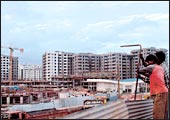 |
| Building boom: Demand for space has
sent realty prices skyrocketing |
|
|
| Up and running: The flyover near the
airport opened two years behind schedule, but hasn't eased
traffic congestion |
That's a view echoed by Chandran Shankaran,
CEO, Zyme Solutions, a provider of high-end ITEs solutions. The
company considered a number of cities within and outside India
before deciding to headquarter in Bangalore. What tilted the balance
in favour of Bangalore? The fact that it offered a deeper pool
of management talent and better access to support services such
as third parties who do certifications, audits, quality, and security.
"All this talk of Bangalore losing its competitive edge is
not true. Entry-level staff costs 10-15 per cent of what it does
in the us, senior manager costs 50 per cent less," says Shankaran.
Only real estate cost is, he notes, almost on par. But there is
clearly a cost advantage if one gets to a reasonable scale-something
that Apple, with just 30 people in the development centre, failed
to do. "Reports of Bangalore's death may not only be premature,
but wildly exaggerated," says K. Jairaj, Bangalore City Corporation
Commissioner, who's just returned from a two-year stint with the
World Bank in Washington, D.C.
Then, there's this whole thing about Brand
Bangalore. "I don't have to explain about Bangalore when
I pitch to clients. That is something hard for its global and
local competitors to replicate," says Prakash Bhalerao, a
serial entrepreneur, all of whose companies tend to have a Bangalore
link, including the latest, Verismo Networks. Venkat Kedlaya of
the Bangalore Chamber of Industry & Commerce (BCIC) and who
also runs his own it company called Convergent Communications,
says that the city offers the best work-life balance of all Indian
cities. A relatively small city, Bangalore's cosmopolitan culture
means it has a vibrant nightlife, which plays out in its 120 or
so pubs every evening, and not just over the weekends.
Interview with H.D.
Kumaaraswaamy, Chief Minister/Karnataka
"We Are Implementing Projects With
Deadlines" |
 Amidst
a hectic assembly session, Karnataka Chief Minister H.D.
Kumaaraswaamy took time off to meet with BT's Venkatesha
Babu. Excerpts from the interview: Amidst
a hectic assembly session, Karnataka Chief Minister H.D.
Kumaaraswaamy took time off to meet with BT's Venkatesha
Babu. Excerpts from the interview:
Are you surprised that Bangalore is at #2 despite the
negative publicity it has been receiving?
Yes, surprised that Bangalore is not actually #1. Having
said that, let me use the platform of Business Today to
thank all investors, CEOs and professionals who have reposed
confidence in the state and more so in Bangalore. It is
true that there were some problems, especially on the infrastructure
front. Bangalore had grown fast and due to that there were
issues, which my government is trying to address.
Infrastructure has definitely been a sore point. What's
your government doing on that front?
Whether it is the new international airport, Metro rail,
roads, water, or power, we have ensured there is traction
on the ground. The new international airport will be completed
by April 2008. Work on the Rs 6,000-crore Metro has already
started and will be ready by 2011. We have spent Rs 500
crore on improving efficiency of power distribution in Bangalore.
Reliability factor of power supply is 99.01 per cent. I
don't think any other major city can assure that. We have
already spent Rs 40 crore to improve roads in Bangalore
and we intend to spend an additional Rs 260 crore over the
next three years. To improve traffic management and (road)
discipline, we are putting up 200 cameras in various parts
of the city, and that I believe will be a first for India.
Rs 3,384 crore is being spent on the Cauvery fourth stage
project to improve water supply. Five new satellite towns
are being set up to decongest the city. These are not just
promises, but projects with deadlines, and I am personally
monitoring them.
What about Mysore?
We are preparing a master plan with a 30-year projection
for this city. Under the urban renewal scheme, both Bangalore
and Mysore will get Rs 1,000 crore. We intend to put this
to good use.
|
That said, Bangalore has real infrastructure
issues to deal with. Its city development plan, submitted under
the Jawaharlal Nehru National Urban Renewal Mission (JNNURM),
was returned for modifications, but Chief Minister H.D. Kumaaraswaamy
is promising to step on the pedal even otherwise. He says his
government plans to spend Rs 260 crore on roads over the next
three years, get the new international airport up and running
by 2008, and the Metro by 2011. "Our aim is to make Bangalore
a model city on par with the best in the world," he told
BT (see We Are Implementing...).
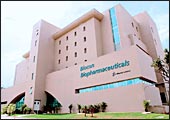 |
| Way to go: Biotech companies such as
Biocon represent the other successful industry in Bangalore |
Even Bangalore's most vocal critics agree
that things are slowly improving. "We have seen a few visible
signs of improvement in Bangalore's infrastructure over the last
few months and the present state government seems to be making
a concerted effort to make things better," says N.R. Narayana
Murthy, Chairman, Infosys Technologies. In the same breath, he
points out that Bangalore has a long way to go before it can be
compared to other global business hubs. "However, a combination
of the city's climate, large talented workforce and its strong
educational presence offer a compelling reason to set up shop
in Bangalore," he says. Murthy should know. About 24 years
ago, he moved a software start up from Pune to Bangalore, and
look where it has got him.
|









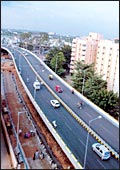
 Amidst
a hectic assembly session, Karnataka Chief Minister H.D.
Kumaaraswaamy took time off to meet with BT's
Amidst
a hectic assembly session, Karnataka Chief Minister H.D.
Kumaaraswaamy took time off to meet with BT's 